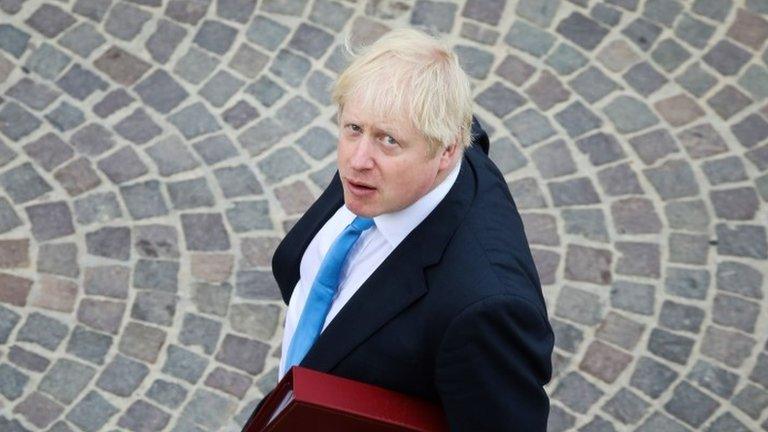Week ahead in Parliament
- Published
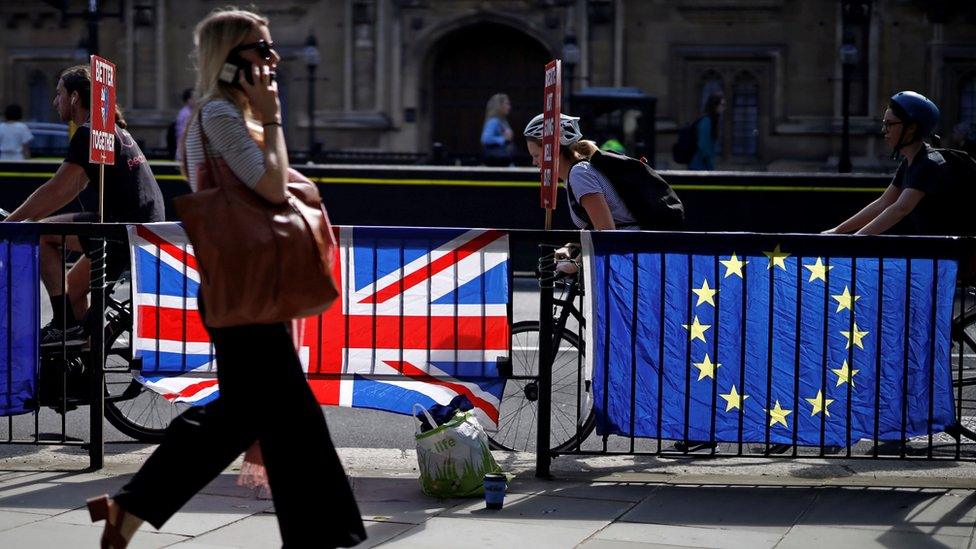
Bullying and Brexit dominate Parliament this week, with a routine piece of Northern Ireland legislation suddenly caught up in efforts to forestall a no-deal Brexit, and MPs getting a chance to debate their latest reports on bullying and harassment in the world of Westminster.
I detail the Brexit manoeuvrings below, but they will involve both the Lords and Commons, in one of those bewilderingly intricate legislative dances when amendments bounce between the two houses.
Meanwhile, the Gemma White report on the treatment of staff working for MPs, and the Naomi Ellenbogen report on bullying and harassment in the House of Lords will continue to reverberate.
The Commons will debate the issue on Wednesday, with MPs expected to approve further steps to tackle the problem - but will they be enough to convince sceptical staff that they are serious?
Here's my rundown of the week ahead:
Monday 15 July
The Commons week opens (14:30 BST) with an hour of Home Office Questions, probably followed by the usual Monday helping of ministerial statements and urgent questions.
Independent MP Heidi Allen is due to present a bill to require the employers of people on zero-hours contracts to offer them the option of guaranteed minimum hours - this will happen without debate, and the bill will be added to a long queue of legislation unlikely to get onto the floor of the House.
The day's main debate is report stage consideration of the High Speed Rail (West Midlands - Crewe) Bill - the legislation authorising the next stage of the controversial HS2 high speed rail project.
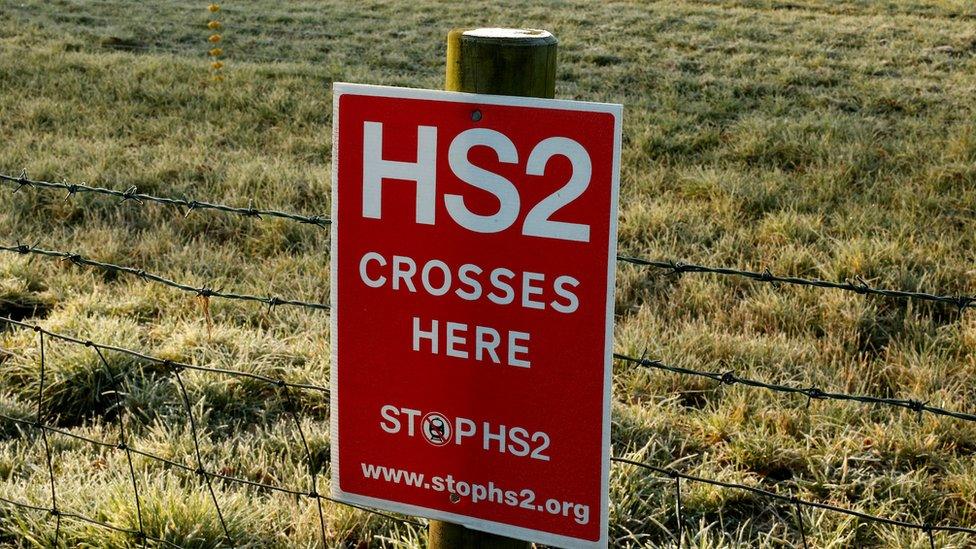
The proposed route for the new railway has prompted numerous protests
This follows two years of work by a bill committee, which has heard petitions and conducted site visits to examine the many planning issues raised by the scheme. Labour has put down amendments calling for a compensation scheme for tenants, quarterly reports on environmental impact, costs and progress and a review by independent experts of the scheme's environmental impact, engineering, and governance.
The adjournment debate, led by the DUP's Ian Paisley, will highlight the findings of a report by the Northern Ireland motorsport taskforce report, which he chaired. The report found that motorsport events contribute around £40m per year to Northern Ireland's economy, and calls for an action plan to maximise the economic potential of events like the North West 200 and Ulster Grand Prix.
In Westminster Hall (16:30 BST) MPs debate a series of petitions on the BBC - starting with one which calls for continued funding for free TV licences for the over-75s. Most pensioners are due to lose them under changes due in 2020. Another calls for a public inquiry into bias at the corporation.
BBC funding will also come up during opening questions in the Lords, when they sit from 14.30 BST.
The main legislating is committee stage consideration of the Northern Ireland (Executive Formation) Bill - this stage is usually a road-testing exercise for amendments, which are not normally pushed to a vote until the report stage, due on Wednesday.
One point to note is that the government is tabling technical amendments to improve the Creasy amendment on abortion rights and the McGinn amendment on equal marriage recently approved by MPs.
These might be accepted without being pushed to a vote, but peers may push other amendments including the Ulster Unionist Lord Morrow's, prohibiting anyone being forced to preside over same-sex marriage, and the Lib Dem Lord Bruce's amendment on transparency of political donations.
Then, peers will debate the 50th anniversary of the first Apollo moon landing on 20 July 1969, exploiting space science and technology, and improving and encouraging public participation in that field.
Then Labour's Shadow Attorney General, Baroness Chakrabarti, has a debate on the processing of rape cases by the Crown Prosecution Service, and reviewing its sexual offences guidance. It comes as new figures reveal the time taken to charge rapists has more than doubled in the past seven years.
Tuesday 16 July
The Commons opens (11:30 BST) with questions to business ministers, followed by a bill introduced under the ten minute rule, external calling for employers to do more to promote flexible working, from Conservative MP Helen Whately. She argues that it can help parents balance work with childcare, and close the gender pay gap.
Then, MPs debate the second reading of the Courts and Tribunals (Online Procedure) Bill - a fairly uncontroversial measure to create a committee to provide rules of court for online proceedings in civil and family courts and tribunals. It may provide an opportunity to raise issues about the strains on the court system.
That will be followed by a backbencher-led debate on the work of the Inter-Ministerial Group on Early Years Family Support. This is led by the former Leader of the House Andrea Leadsom - currently out of office - who has a long record of campaigning on this issue, dating back to her arrival in the Commons in 2010, along with Labour's Lucy Powell and the Lib Dem former Health Minister Norman Lamb.
Andrea Leadsom chaired an inter-ministerial group on behalf of the prime minister, which looked at the mix of policies relating to a child's first 1,001 days of life. Experiences in this period have far-reaching consequences for children's mental health, self-confidence, ability to learn and later propensity to get into a gang or a life of knife crime or addiction. She believes there is strong cross-party interest, and will be proposing a motion calling for action on the group's recommendations, particularly with a change of prime minister imminent.
In Westminster Hall, the opening debate is on Defence spending (09.30 BST) - Conservative MP Anne-Marie Trevelyan will be arguing that UK defence spending is too low, in a dangerous world, and that events in the Gulf are just the latest illustration of the need to strengthen the armed forces. Other subjects include: children and mental health services (14:30 BST); tariffs on agricultural products in the event of a no-deal Brexit (16:00 BST) and drug treatment services (16:30 BST).

My committee pick is the Justice Committee inquiry into Prison Governance (10:00 BST) with HM Chief Inspector of Prisons, Peter Clarke, Prisons Minister Robert Buckland and Jo Farrar, the Chief Executive of HM Prison and Probation Service. This inquiry is taking a searching look at the state of the prisons system in the wake of changes intended to give more power to prison governors to deliver education and health services and rehabilitation.
In the Lords (14:30 BST), peers will rubber-stamp the Supply and Appropriation (Main Estimates) (No. 3) Bill which will go through all stages of debate in a single sitting (peers are not allowed to interfere with money bills).
Then there are debates on two select committee reports: first, the report from the International Relations Committee on nuclear risks, disarmament and the Nuclear Non-Proliferation Treaty; the second, from the EU Committee, is on the European Investment Bank.
Wednesday 17 July
MPs begin their day (11:30 BST) with half an hour of International Development Questions - perhaps a last hurrah for secretary of state and former leadership candidate Rory Stewart? And then at noon it's Theresa May's penultimate Prime Minister's Question Time.
The day's ten-minute rule bill, from Labour's Holly Lynch, would give the Environment Agency extra powers to require water companies to manage reservoirs in a way which reduces flood risk.
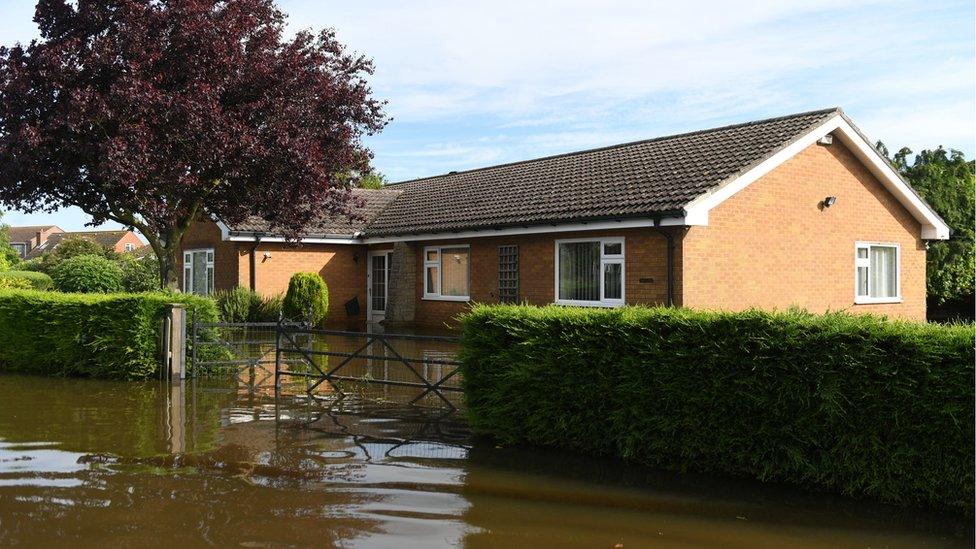
Some parts of Lincolnshire saw flooding earlier this summer
Then, MPs debate bullying and harassment in Westminster - this will cover the recommendations of the Laura Cox review into the treatment of House staff and the parallel Gemma White report on MPs' staff. Both found significant problems but the issue will be the response. MPs will be asked to approve a motion which will lift the current cut-off point - June 2017 - beyond which historic allegations are not investigated.
In Westminster Hall, the subjects for debate include music education in England (09:30 BST), a review of decision-making powers of the Criminal Cases Review Commission, the legal duties of the health secretary for NHS workforce planning and supply in England (14:30 BST), the contribution of aquaculture to the UK economy (16:00 BST), and funding for small schools and village schools.
On the committee corridor, the Digital, Culture, Media and Sport Committee (14.30 BST) quizzes BBC Director General Tony Hall on the corporation's annual report and the issue of TV licences for the over-75s.
The Public Accounts Committee (also 14:30 BST) focuses on serious and organised crime, with evidence from Sir Philip Rutnam, the Permanent Secretary at the Home Office, and Lynne Owens, the Director General of the National Crime Agency.
In the Lords (15:00 BST), questions to ministers include the Conservative Lord Hayward asking about introducing a 10p plastic bag charge in England.
Then, peers will polish off the report stage of the Wild Animals in Circuses (No.2) Bill - where at the time of writing, there seem to be no amendments down for consideration - so this could be over pretty rapidly.
There will then be some significant action over the report stage and third reading for the Northern Ireland (Executive Formation) Bill - these are normally fairly routine measures about the continuity of government in Northern Ireland, while the devolved institutions are suspended, but this bill has become a vehicle for some attempted procedural wizardry to try and prevent the government from suspending parliament so that MPs cannot intervene to stop a no-deal Brexit.
An amendment requiring fortnightly reports to Parliament on the progress to restore devolution was passed in the Commons. This was intended to ensure MPs had to be in Westminster, but it might be interpreted as merely requiring written reports, rather than action in the House.
There is now a cross-party amendment down to ensure there is no gap between the reports being 'published', as required under the current version of the bill, and bring formally laid before both Houses.
Once laid, the government would be required to table 'take note' motions in both the Commons and Lords, with these debates to take place within five calendar days - and note that the reference to 'calendar days' rather than 'sitting days' means that if Parliament is not sitting (i.e. because it is in recess or has been prorogued), it should be recalled to allow the debates to take place.
The issue of prorogation of Parliament is currently outside the scope of the bill, but this could change if it is amended during its passage through the Lords - which could be significant when the Commons come to deal with changes made by their lordships.
And of course, peers will address the issues raised by other Commons amendments to the bill - on same sex-marriage, abortion rights, pensions for victims of terrorism and compensation for historic abuse victims.
Finally, there's a rare intervention from the former Deputy Prime Minister Lord Heseltine, who will lead a debate on devolution to English cities in the light of his report 'Empowering English Cities'.
Until he fell out with the government over Brexit, he was the driving force behind its city devolution agenda, operating from an office next to the then Communities Secretary, Greg Clark. In fact, this is an agenda he has been pushing since his days as a junior minister under Edward Heath - so this may be an interesting exploration of nearly half a century of local government policy.
Thursday 18 July
The Commons gets under way at 09:30 BST with Transport Questions, followed by the weekly business statement from the Leader of the House, Mel Stride.
Then MPs may have to respond any amendments made in the Lords to the Northern Ireland (Executive Formation) Bill - Conservative peers are on a three-line whip to remain in Westminster on Thursday, with a warning that they might be sitting later than usual, if the Lords have added in changes which genuinely threaten to block the government's ability to suspend parliament. There's even the prospect of a couple of rounds of parliamentary ping pong, extending into the following week.
The main debates are on two motions chosen by the Backbench Business Committee - first on the Bishop of Truro's review into the persecution of Christians around the world.
With an estimated 245m Christians living in countries where they face high levels of persecution, the backers of the motion want to make the case that the UK government is not doing enough, and should deploy its diplomatic resources and the overseas aid budget to stop governments in other countries from either encouraging or ignoring persecution. After that, there is a general debate on how much the health department spends on non-invasive precision therapies.
In Westminster Hall, (13:30 BST) MPs debate human rights in Saudi Arabia and the detention of opponents of the regime - the latest in a series of debates on human rights issues led by the Lib Dem former Cabinet Minister, Alistair Carmichael.
In the Lords (11:00 BST), question time sees the Conservative former cabinet minister Lord Forsyth of Drumlean asking about government advice to British citizens intending to climb Mount Everest during the autumn and spring seasons to reduce the risk of loss of life.
The main debate, led by the Labour peer and former Engineering Workers leader Lord Jordan, is on the future of trade unions, wider industry representation, and the 100th anniversary of the International Labour Organisation.
Peers will also debate the United States' Peace to Prosperity economic plan for the Palestinians, and funding levels for public services used by young adults.
Friday 19 July
MPs are not sitting, but in the Lords (10:00 BST), peers debate two private members' bills.
The first, proposed by the Lib Dem Peer Lord Oates, would provide a guarantee in British law that, regardless of the outcome of the EU withdrawal process, the rights of EU citizens and other EEA nationals living in the UK would be protected.
He says this would enact the Vote Leave referendum campaign promise that EEA citizens "will automatically be granted indefinite leave to remain in the UK and will be treated no less favourably than they are at present".
The day's second bill is the Victims of Crime (Rights, Entitlements, and Notification of Child Sexual Abuse) Bill proposed by the Lib Dem, Baroness Brinton.
- Published11 July 2019
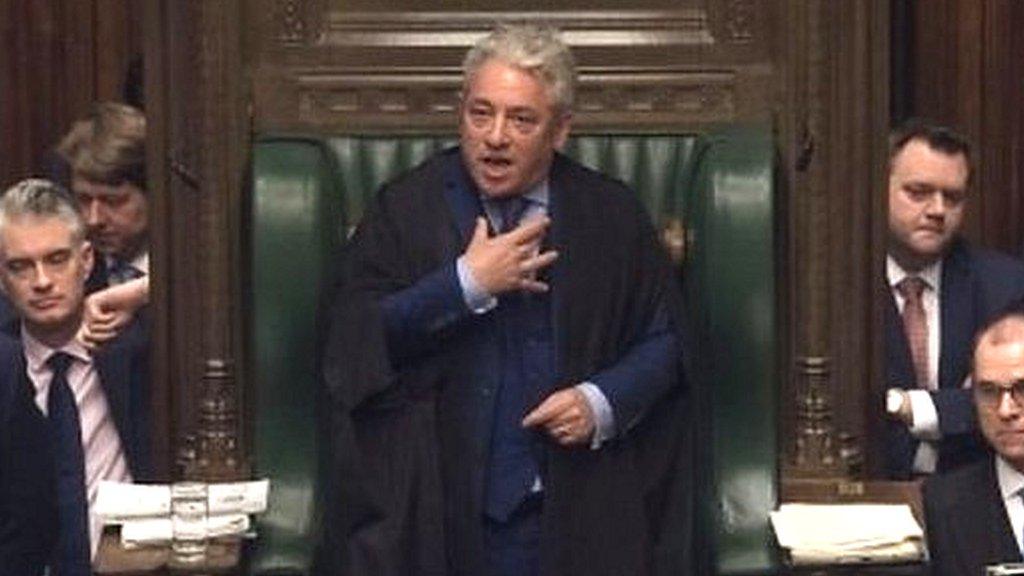
- Published3 September 2019
